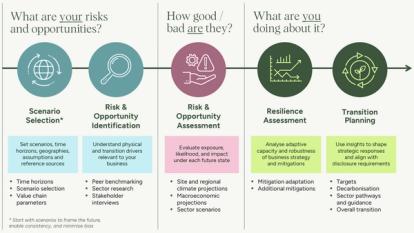
Start with the Future: Why Climate Scenarios Come First
- Post Date
- 17 September 2025
- Read Time
- 4 minutes

As part of the Australian Sustainability Reporting Standards (ASRS), Australian companies are expected to undertake a climate scenario analysis to understand their exposure to climate-related risks and opportunities
But for many, this process is unfamiliar, and we often hear: “Where do we even begin?”
(You can learn more about the requirements and key steps companies need to take for compliance via our recent ASRS Webinar and An Introduction to Climate Scenario Analysis webinar).
The Risk of Skipping Steps
We have seen some reporting entities jumping straight into identifying climate risks and opportunities without first considering climate scenarios. This shortcut may seem efficient or resemble general corporate risk management practices, but it introduces strategic and process-related gaps:
- It directs decisions with current knowledge and biases, rather than future possibilities.
- It overlooks long-term climate impacts that fall outside typical risk assessment horizons.
- It can lead to blind spots, where emerging or systemic risks are missed entirely.
That is why we start with climate scenarios. Before diving into risks, opportunities, or resilience, we take a step back and ask: What are the potential futures that could impact us?
Our Approach: Start with Scenarios
At SLR, our approach is designed to be robust and embedded within your strategic processes. We begin by exploring how different climate futures could unfold, each shaped by varying policy responses, emissions trajectories, and global temperature outcomes. This sets the scene, aligns with the International Financial Reporting Standards (IFRS) guidance, and incorporates scenario analysis within your risk and opportunity management process.
Our structured approach answers three key questions:

What Happens After Scenario Selection?
Once we’ve defined the future landscapes through scenario selection, we move on to the rest of our approach, designed to turn insights into action.
Our process enables you to answer those three key questions above, not just for disclosure, but to gain a deeper understanding of your business exposure through:
1. Reduced Bias
Scenarios give everyone a shared lens. Instead of reacting to current state urgencies or gut feelings, you’re assessing risks and opportunities based on a set of scenario-specific assumptions. By not working backwards from your preferred or expected future, you reduce bias, and gain a more balanced, holistic perspective.
2. Alignment with ASRS
ASRS doesn’t just ask if you’ve done scenario analysis—it asks how it informs your risk identification. Starting with scenarios helps embed them into your process from the outset, not as an afterthought.
3. Comparability and Consistency
Scenarios help to standardise assumptions, like policy shifts, carbon pricing, or temperature outcomes, across business units. This leads to more coherent, comparable insights that support better decision-making.
Compliance to Strategy
When done right, climate scenario analysis goes beyond compliance – it becomes a strategic tool and enables you to:
- Test your business model’s resilience.
- Explore how different futures could impact your operations.
- Plan for long-term change.
We’ve helped organisations across sectors use scenario analysis to uncover insights that go far beyond reporting. It’s about building resilience, spotting opportunities, and making smarter decisions.
How can SLR support you?
We understand that for many companies, preparing for climate-related disclosures can be challenging. We have designed our approach to climate data and disclosures to be assurance ready from the outset. Our global team of climate experts has extensive experience supporting clients through both limited and reasonable assurance of their climate disclosures and understand the nuances, requirements, and common pitfalls. Whether you are experienced in climate reporting or starting your disclosures for the first time, SLR can support you in navigating the requirements.
Contact us to discuss further.
Want to learn more?
Our Climate Experts have prepared an ASRS Factsheet to help you find your feet with the mandatory climate disclosures. You can also catch up on requirements and our expert insights via our previous webinars:
- ASRS: An Introduction to Climate Scenario Analysis
- ASRS: Where to start for Mandatory Climate Disclosures in 2025
- The cost of climate webinar session 1: calculating the financial impact of risks and opportunities
- The cost of climate webinar session 2: calculating the financial impact of risks and opportunities
- ASRS assurance requirements: what you need to know, and what you can expect from the process
Recent posts
-

-

Unlocking value through solar PV repowering: A focus on module replacement and DC/AC optimisation
by David Fernandez
View post -
